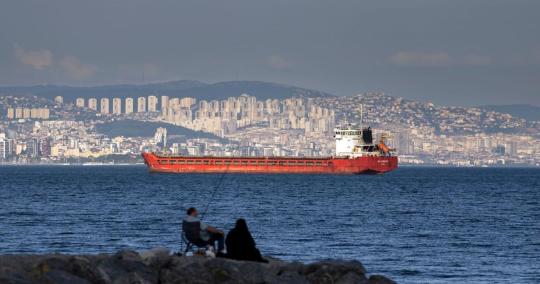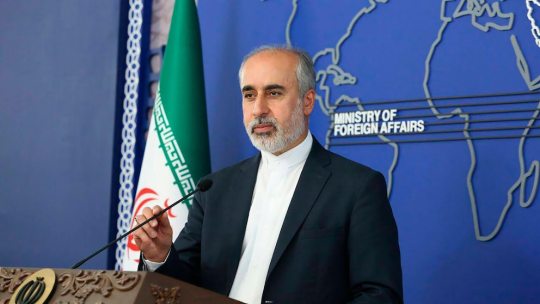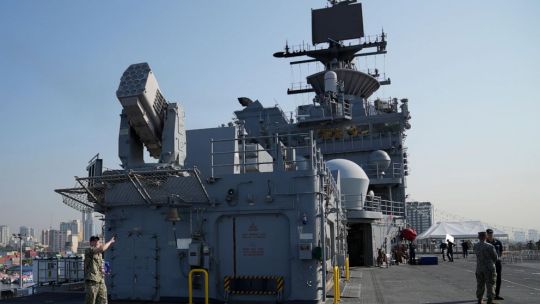#International Agreements
Text
This is not a situation of waging war according to the laws of war and the Geneva Convention — this is a completely different philosophy of war where civilian lives are disregarded entirely.
Pavlo Kovtoniuk quoted in an article by Stephanie Nolen in Japan Times, originally published in The New York Times. In global conflict zones, hospitals and doctors are no longer spared
148 notes
·
View notes
Text
Top UN court opens hearings in a case accusing Germany of facilitating Israel's Gaza conflict
THE HAGUE, Netherlands (AP) — Nicaragua on Monday called on the United Nations’ top court to halt German military and other aid to Israel, arguing that Berlin’s support was enabling acts of genocide and breaches of international humanitarian law in the Israel-Hamas war in Gaza.
Opening Nicaragua’s case at the International Court of Justice, the country’s ambassador to the Netherlands, Carlos José…
View On WordPress
#courts#Europe#foreign aid#gaza strip#General News#genocide#Germany#Germany government#hamas#I#International agreements#Israel#Israel government#Israel-Hamas war#Nicaragua#politics#United Nations#world news
4 notes
·
View notes
Link
Indeed, in a paper entitled When International Agreements Utterly Failed, David Makovsky, distinguished fellow at The Washington Institute, analyzes the events that led to the 1967 Six-Day War, which erupted after Egypt closed the Tiran Straits to Israeli navigation. This comprised a critical blow to Israel, which at the time relied on strategic oil imports from Iran supplied via the Straits.
Significantly, for the purposes of this discussion, Israel believed it had secured a guarantee of freedom of navigation through the Straits from the US and the international community in 1957—when it withdrew its forces from the Sinai peninsula following the 1956 Sinai Campaign. Moreover, Israel declared that any future closure of the Tiran Straits to Israeli shipping by Egypt would be considered a clear casus belli. Despite this warning, on May 23, 1967, Egyptian president Abdul Gamal Nasser ordered the closure of the Straits to Israeli vessels.
Israel dispatched foreign minister Abba Eban on an urgent trip to Paris, London, and Washington, to urge the international community to re-open the Straits and avert war. However, Eban encountered an apathetic, obtuse and cynical international response. For example, even though the then French president, Charles De Gaulle conceded that a commitment had been made to Israel to keep the Tiran Straits open, he curtly dismissed the pledge, declaring, "that was 1957…now [is] 1967."
12 notes
·
View notes
Text
European Immigration Policies: A Complex Quandary
🌐 Explore the intricacies of European immigration policies! From France's political dynamics to Germany's stance and transformative EU reforms, grasp the complexities shaping the continent's approach. 🤔💬
Join the conversation and stay informed! Check out our insightful YouTube video for an in-depth analysis: 🎥✨
youtube
#europeanimmigration#migrationdebate#eureforms#stayinformed#European Immigration#Migration Debate#EU Reforms#Geopolitics#Policy Analysis#Global Issues#Immigration Challenges#European Union#Political Dynamics#Asylum System#Deportation Rules#International Agreements#Border Security#Economic Impact#Youtube
0 notes
Text
Japan, US agree to cooperate on geothermal energy
Japan and the United States have agreed to cooperate on developing geothermal energy, one of the most plentiful resources on this volcanic island chain
ByELAINE KURTENBACH AP Business Writer
SAPPORO, Japan — Japan and the United States agreed Saturday to cooperate on developing geothermal energy, one of the most plentiful resources on this volcanic island chain.
The memorandum of commitment was…

View On WordPress
#4#agree#Business#Climate and environment#cooperate#Energy#G-7 Summit#General news#geothermal#Green technology#International agreements#japan#Politics#Renewable energy
0 notes
Text
Nations reach accord to protect marine life on high seas
WASHINGTON — For the first time, United Nations members have agreed on a unified treaty to protect biodiversity in the high seas — nearly half the planet’s surface — concluding two weeks of talks in New York.
The U.N. Convention on the Law of the Sea came into force in 1994, before marine biodiversity was a well-established concept.
An updated framework to protect marine life in the regions…
View On WordPress
#Animals#Biodiversity#Climate and environment#Dolphins and porpoises#environmental conservation#Fish#General news#International agreements#Politics#Science#Turtles#Whales
0 notes
Text
Remind governments to respect their commitments to international agreements.

International Human Solidarity Day is:
a day to celebrate our unity in diversity;
a day to remind governments to respect their commitments to international agreements;
a day to raise public awareness of the importance of solidarity;
a day to encourage debate on the ways to promote solidarity for the achievement of the Sustainable Development Goals including poverty eradication;
a day of action to encourage new initiatives for poverty eradication.
#International Human Solidarity Day#poverty alleviation#20 december#2030 agenda#solidarityday#United Nations Department of Economic and Social Affairs#UNDESA#international agreements
0 notes
Text
Ratify Treaty on the Prohibition of the Emplacement of Nuclear Weapons and Other Weapons of Mass Destruction on the Sea-Bed and the Ocean Floor and in the Subsoil Thereof of 1971.
The States Parties to this Treaty,
Recognizing the common interest of mankind in the progress of the exploration and use of the sea-bed and the ocean floor for peaceful purposes,
Considering that the prevention of a nuclear arms race on the sea-bed and the ocean floor serves the interests of maintaining world peace, reduces international tensions and strengthens friendly relations among States.
Convinced that this Treaty constitutes a step towards the exclusion of the sea-bed, the ocean floor and the subsoil thereof from the arms race,
Convinced that this Treaty constitutes a step towards a treaty on general and complete disarmament under strict and effective international control, and determined to continue negotiations to this end,
Convinced that this Treaty will further the purposes and principles of the Charter of the United Nations in a manner consistent with the principles of international law and without infringing the freedoms of the high seas.
Have agreed as follows:
Article I
1.The States Parties to this Treaty undertake not to emplant or emplace on the sea-bed and the ocean floor and in the subsoil thereof beyond the outer limit of a sea-bed zone, as defined in Article II, any nuclear weapons or any other types of weapons of mass destruction as well as structures launching installations or any other facilities specifically designed for storing, testing or using such weapons.
2.The undertakings of paragraph 1 of this Article shall also apply to the sea-bed zone referred to in the same paragraph, except that within such sea-bed zone, they shall not apply either to the coastal States or to the sea-bed beneath its territorial waters.
3.The States Parties to this Treaty undertake not to assist; encourage or induce any State to carry out activities referred to in paragraph 1 of this Article and not to participate in any other way in such actions.
Article II
For the purpose of this Treaty, the outer limit of the sea-bed zone referred to in Article I shall be coterminous with the twelve-mile outer limit of the zone referred to in Part II of the Convention on the Territorial Sea and the Contiguous Zone, signed at Geneva on 29 April 1958, and shall be measured in accordance with the provisions of Part I, Section II of that Convention and in accordance with international law.
Article III
1.In order to promote the objectives of and ensure compliance with the provisions of this Treaty, each State Party to the Treaty shall have the right to verify through observation the activities of other State Parties to the Treaty on the sea-bed and the ocean floor and in the subsoil thereof beyond the zone referred to in Article I provided that observation does not interfere with such activities.
2.If after observation reasonable doubts remain concerning the fulfilment of the obligations assumed under the Treaty, the State Party having such doubts and the State Party that is responsible for the activities giving rise to the doubts shall consult with a view to removing the doubts. If the doubts persist, the State Party having such doubts shall notify the other States Parties, and the Parties concerned shall co-operate on such further procedures for verification as may be agreed, including appropriate inspection of objects structures, installations or other facilities that reasonably may be expected to be of a kind described in Article I. The Parties in the region of the activities, including any coastal State, and any other Party so requesting, shall be entitled to participate in such consultation and co-operation. After completion of the further procedures for verification, an appropriate report shall be circulated to other parties by the Party that initiated such procedures.
3.If the State responsible for the activities giving rise to the reasonable doubts is not identifiable by observation of the object, structure, installation or other facility, the State Party having such doubts shall notify and make appropriate inquiries of States Parties in the region of the activities and of any other State Party. If it is ascertained through these inquiries that a particular State Party is responsible for the activities, that State Party shall consult and co-operate with other Parties as provided in paragraph 2 of this Article. If the identity of the State responsible for the activities cannot be ascertained through these inquiries, then further verification procedures, including inspection, may be undertaken by the inquiring State Party, which shall invite the participation of the Parties in the region of the activities, including any coastal State, and of any other Party desiring to co-operate.
4.If consultation and co-operation pursuant to paragraphs 2 and 3 of this Article have not removed the doubts concerning the activities and there remains a serious question concerning fulfilment of the obligations assumed under this Treaty, a State Party may, in accordance with the provisions of the Charter of the United Nations, refer the matter to the Security Council, which may take action in accordance with the Charter.
5.Verification pursuant to this Article may be undertaken by any State Party using its own means, or with the full or partial assistance of any other State Party, or through appropriate international procedures within the framework of the United Nations and in accordance with its Charter.
6.Verification activities pursuant to this Treaty shall not interfere with activities of other States Parties and shall be conducted with due regard for rights recognized under international law, including the freedoms of the high seas and the rights of coastal States with respect to the exploration and exploitation of their continental shelves.
Article IV
Nothing in this Treaty shall be interpreted as supporting or prejudicing the position of any State Party with respect to existing international conventions, including the 1958 Convention on the Territorial Sea and the Contiguous Zone, or with respect to rights or claims which such State Party may assert, or with respect to recognition or non-recognition of rights or claims asserted by any other State, related to waters off its coasts including, inter alia, territorial seas and contiguous zones or to the sea-bed and the ocean floor including continental shelves.
Article V
The Parties to this Treaty undertake to continue negotiations in good faith concerning further measures in the field of disarmament for the prevention of an arms race on the sea-bed, the ocean floor and the subsoil thereof.
Article VI
Any State Party may propose amendments to this Treaty. Amendments shall enter into force for each State Party accepting the amendments upon their acceptance by a majority of the States Parties to the Treaty and, thereafter, for each remaining State Party on the date of acceptance by it.
Article VII
Five years after the entry into force of this Treaty, a conference of Parties to the Treaty shall be held at Geneva, Switzerland, in order to review the operation of this Treaty with a view to assuring that the purposes of the preamble and the provisions of the Treaty are being realized. Such review shall take into account any relevant technological developments. The review conference shall determine, in accordance with the views of a majority of those Parties attending, whether and when an additional review conference shall be convened.
Article VIII
Each State party to this Treaty shall in exercising its national sovereignty have the right to withdraw from this Treaty if it decides that extraordinary events related to the subject-matter of this Treaty have jeopardized the supreme interests of its country. It shall give notice of such withdrawal to all other States Parties to the Treaty and to the United Nations Security Council three months in advance. Such notice shall include a statement of the extraordinary events it considers to have jeopardized its supreme interests.
Article IX
The provisions of this Treaty shall in no way affect the obligations assumed by States Parties to the Treaty under international instruments establishing zones free from nuclear weapons.
Article X
1.This Treaty shall be open for signature to all States. Any State which does not sign the Treaty before its entry into force in accordance with paragraph 3 of this Article may accede to it at any time.
2.This Treaty shall be subject to ratification by signatory States. Instruments of ratification and of accession shall be deposited with the Governments of the United Kingdom of Great Britain and Northern Ireland, the Union of Soviet Socialist Republics and the United States of America, which are hereby designated the Depositary Governments.
3.This Treaty shall enter into force after the deposit of instruments of ratification by twenty-two Governments, including the Governments designated as Depositary Governments of this Treaty.
4.For States whose instruments of ratification or and accession are deposited after the entry into force of this Treaty, it shall enter into force on the date of the deposit of their instruments of ratification or accession.
5.The Depositary Government shall promptly inform the Governments of all signatory and acceding States of the date of each signature, of the date of deposit of each instrument of ratification or of accession, of the date of the entry into force of this Treaty, and of the receipts of other notices.
6.This Treaty shall be registered by the Depositary Governments pursuant to Article 102 of the Charter of the United Nations.
Article XI
This Treaty, the English, Russian, French, Spanish and Chinese texts of which are equally authentic, shall be deposited in the archives of the Depositary Governments. Duly certified copies of this Treaty shall be transmitted by the Depositary Governments to
Treaty on the Prohibition of the Emplacement of Nuclear Weapons and Other Weapons of Mass Destruction on the Sea-Bed and the Ocean Floor and in the Subsoil Thereof (1971)
#Emplacement of Nuclear Weapons#Weapons of Mass Destruction#Underwater tests#International Treaties#ratification#international agreements
0 notes
Text
"A beacon of hope': Ukraine, Russia sign grain export deal | Business News
“A beacon of hope’: Ukraine, Russia sign grain export deal | Business News
If you know of local business openings or closings, please notify us here.
PREVIOUS OPENINGS AND CLOSINGS
· Jimmy’s Barbershop in Allentown has moved to 822 N. 19th Street
· Air Products and Chemicals Inc.’s chosen warehouse developer, Prologis Inc., will have to wait until July 13 for a final decision by Upper Macungie Township’s zoning hearing board on 2.61 million square feet of warehouses.
·…

View On WordPress
#Agriculture#apmediaapi#Beacon#Blockades#business#Crop farming#dcc#deal#Economy#Export#general news#government and politics#Grain#Grain farming#hope#Industrial products and services#international agreements#international relations#international trade#leading economic indicators#military and defense#national governments#News#Russia#Russia-Ukraine war#Sailing#sign#sports#stock prices#transportation and shipping
0 notes
Text
US postpones decision on aid to Israeli army battalion accused of abuses against Palestinians
WASHINGTON (AP) — Secretary of State Antony Blinken has determined that an Israeli army battalion committed grave human-rights abuses against Palestinians in the West Bank before the war in Gaza. But he said in a letter to House Speaker Mike Johnson that he is postponing a decision on blocking aid to the unit to give Israel more time to right the wrongdoing.
The undated letter, obtained by The…
View On WordPress
#antony blinken#Crime#gaza strip#General News#Government and politics#hamas#International agreements#Israel#Israel government#Israel-Hamas war#Middle East#mike johnson#politics#protests and demonstrations#United States government#w#War and unrest#Washington News#west bank#world news
0 notes
Text
WTO chief sees 'bumpy' road as ministers work to reach deals
WTO chief sees ‘bumpy’ road as ministers work to reach deals
GENEVA — The head of the World Trade Organization predicted a “bumpy and rocky” road as the trade body opened its highest-level meeting in 4-1/2 years Sunday, with issues like pandemic preparedness, food insecurity against the backdrop of Russia’s war in Ukraine and overfishing of the world’s seas on the agenda.
At a time when some experts question WTO’s future and relevance, Director-General…
View On WordPress
#bumpy#chief#Climate and environment#Coronavirus#deals#Diseases and conditions#Environment#Environmental concerns#Free trade#Global trade#health#Infectious dis#International agreements#International relations#Lung disease#ministers#Overfishing#Reach#Road#Sees#Trade agreements#wildlife#work#WTO
0 notes
Text
An Iran-US prisoner swap is likely as $6 billion of once-frozen Iranian assets arrive in Qatar
An Iran-US prisoner swap is likely as $6 billion of once-frozen Iranian assets arrive in Qatar
DUBAI, United Arab Emirates — Iran and the United States will exchange prisoners on Monday as nearly $6 billion once frozen in South Korea arrives in Qatar, a key element of the planned exchange.
DUBAI, United Arab Emirates — Iran and the United States will exchange prisoners on Monday as nearly $6…

View On WordPress
#103271721#arrive#Article#assets#billion#General news#International Agreements#Iranian#IranUS#oncefrozen#Politics#prisoner#Qatar#swap#world news
1 note
·
View note
Text
US, Philippines hold largest war drills near disputed waters
MANILA, Philippines — The United States and the Philippines on Tuesday launch their largest combat exercises in decades that will involve live-fire drills, including a boat-sinking rocket assault in waters across the South China Sea and the Taiwan Strait that will likely inflame China.
The annual drills by the longtime treaty allies called Balikatan — Tagalog for shoulder-to-shoulder — will run…

View On WordPress
#4#disputed#drills#Fires#General news#Government and politics#hold#International agreements#largest#Military technology#philippines#Physical fitness#Politics#war#War and unrest#waters
1 note
·
View note
Text
Ahmed Qureia, top Palestinian negotiator with Israel, dies
RAMALLAH, West Bank — Ahmed Qureia, a former Palestinian prime minister and one of the architects of interim peace deals with Israel, has died at age 85.
A key player in the 1993 Oslo peace accords, Qureia witnessed the rise of the dream of Palestinian statehood that surged during the negotiations. But he also saw those hopes recede, with the prospect of a two-state solution to the…
View On WordPress
0 notes
Link
Certificate Course in International Trade
iiiEM offers the best export-import training course in Ahmedabad, It is an Institute for Export-Import Management Program based in Ahmedabad. We believe in enhancing the skills of youngsters by providing training so as to exhibit their innovative minds at the international level. Our Vision To become India's Leading Practical Oriented International Business Management Training Center.
#export#textiles#exporter#export business#import export business#import#importer#import business#import export#international#international business#international trade#international agreements#internationalbusiness#education#educacion#knowledge#globaleducation#apeda#entrepreneur#development#documentation#clients#entreprenuership#blog#blogs#new blog#study blog#training#industry
0 notes
Text

Hitler observed the Munich agreement for less than 24 weeks. And the invasion of Poland began just over 11 months after Munich. Appeasement is not the road to peace.
Ethnonationalist dictators are not interested in the rule of law – including international law. That's usually how they got to be dictators in the first place.
Putin violated a host of international agreements and treaties when he invaded Ukraine. That includes the United Nations Charter, the 1975 Helsinki agreement, and the 1994 Budapest Memorandum on Security Assurances. And all through this war, Putin has been violating the Convention on the Prevention and Punishment of the Crime of Genocide which went into effect in 1951.
Anybody who believes that Putin would adhere to any future agreements on Ukraine has to score in the top 1% of the population for gullibility.
#invasion of ukraine#UkraineAidNow#neville chamberlain#adolph hitler#1938 munich agreement#czechoslovakia#scrap of paper#gullibility#appeasement#dictators#vladimir putin#genocide#violations of international law#russia's war of aggression#путлер#россия#владимир путин#путин хуйло#добей путина#путин - военный преступник#геноцид#нарушение россией будапештского меморандума#путина в гаагу!#диктатура#руки прочь от украины!#геть з україни#адольф гитлер#невілл чемберлен#слава україні!#героям слава!
22 notes
·
View notes